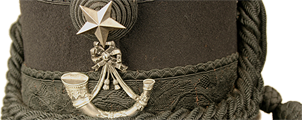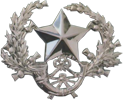Memories of Service Part II: Dr Ron Callender
PART TWO : EGYPT (or EGG-WIPED) !
(It wasn’t polite … but we soon learned, everyone called Egypt ‘Egg-wiped’.)
Very slowly, we were able to piece together what was happening. The Suez Canal Zone needed 6,000 troops urgently and from Blackbushe Airport, Grahame and I flew to Malta for a meal, and then on to Fayid in Egypt. Egypt was in turmoil and once we had landed, we were enveloped in chaos ! We soon learned the meaning of “Abrogation”; the Egyptians had withdrawn all forms of support for the British Army. King George VI died in London and triggered activities throughout the Canal Zone. Egypt’s King Farouk was unpopular and had severed ties with Britain. Beds were found for five of us in the camp of the Long Range Desert Group; these soldiers ragged us mercilessly and, for three or four days, we just sat on our beds waiting for something to happen.
At last, we transferred to GHQ in Fayid and were allocated a four-man tent.
By good fortune, the four of us renewed friendships from the Chichester days and swopped ‘group numbers’. Grahame and I were 51-17; we would go home to ‘Blighty’ in 21months time. Louis prepared a monthly demob chart; Tony improvised a method for making ‘chi’ by tapping power from the tent’s light bulb. We established a routine for filling the clay ‘chaguls’ with water, and negotiated a method for obtaining supplies of tea and sugar.
Grahame and I were assigned to shift work in Staff Message Control where a Warrant Officer outlined the routines. Twelve hours on and twelve hours off became our daily habit; we received messages from around the world and distributed them to sections of GHQ. Some were ‘Restricted’ or ‘Secret’ or ‘Top Secret’, but often carried urgency, such as “Priority”, “Operational immediate”, or the dreaded “Flash”! Top Secret and Flash had to be in and out in a matter of seconds.
There was a bonus. We were bound to secrecy but learned what was going on in Egypt and how the army was coping with the unrest and the daily upheavals.
After a night shift, there was also an experience. A walk of two miles took us through a small village by the Sweet Water Canal which had a dreadful smell. Here we were plagued to purchase leather wallets and dubious watches.
It was, however, the route to a Lido by the Great Bitter Lake, where the army had sunk six barges to create an improvised swimming pool. We took the chance to relax by snoozing, roasting and swimming in the warm water of the Great Bitter Lake.
During the summer, the GHQ companies trained hard for the athletic games to be held in the Olympia stadium. My pal Grahame worked hard for the 5,000 metres, whereas my choice was the hop, skip and jump. This I had mastered while at high school, back in Motherwell. When I emerged first, the prize was a small silver cup and a round of drinks in the Naafi.
Trouble escalated in Egypt when General Mohamad Naquib coaxed his Free Army officers to revolt and to overthrow the government. Messages continued non-stop and an “Active Service” category became the rule for troops in the Canal Zone. Britain persuaded the unpopular King Farouk to seek exile in Rome and all the moves before his midnight deadline were noted, recorded and transmitted to London. More messages !
The pressure abated with a respite of two weeks leave at a very pleasant holiday camp for military personnel in Port Said. On return to work and the shift work regime at Staff Message Control, one event cheered me up. My Rifleman status moved to NCO when I received two stripes … even although the shift system demanded concentration and dedication.
Trouble with the Mau Mau in Kenya created a maelstrom of message traffic. In January 1952, Egypt’s police waged an unnecessary battle with the British army in Ismailia. An RAF aircraftsman was kidnapped in Ismailia, another crisis erupted. Rapid messages passed between London’s War Office and the Middle East Land Forces negotiating his release.
Lewis’s ‘demob chart’ was filling up. It was September; our knees were brown and we packed all the summer clothing and personal effects into our kitbags and waited, and waited. When the call came, we climbed aboard a truck and sang on our way to the airport. Bad news followed. The Anson plane was being repaired but after two years, we were familiar with delays and waiting. So … we waited.
Eventually the plane managed to reach Malta but needed more repairs. As passengers we bussed to a former monastery in a small town, Mtarfa and told to wait. Of course, we waited … and waited … but once we established there would be no movement each day, we took the local bus service into Valletta.
It was a scramble after six days when news filtered through – “Get ready for departure; a bus is leaving for the airport.” Some hours later we had a meal in Malta then it was homeward bound for Blackbushe airport in Surrey. A coach took us to London and the conversation was kind of sentimental as we viewed ‘the green fields’ on either side of the road. The bus load split up and we all went our different ways.
Somehow, Grahame and I reached Winston Barracks in Lanark. It was a Saturday and the kindly duty Sgt Major welcomed us. “Stuff yer kit in there and report back on Monday morning at nine o’clock,” he said … and we quick marched back to Lanark for the bus.
We were home … but realised that we still faced three and a half service in the Territorial Army.
To be continued…
RMC April 2024
Copyright © 2024 Dr Ron M. Callender
Comments: 0











Leave a Reply